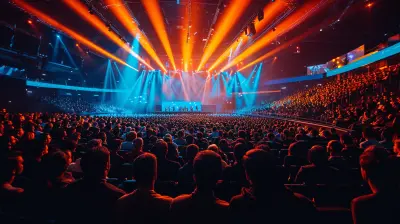How Smart Homes Will Evolve with AI Integration
24 May 2025
Smart homes have come a long way from simple motion-sensing lights and basic voice assistants. With artificial intelligence (AI) stepping up its game, the future of home automation looks more futuristic than ever. Imagine a home that not only follows your commands but also anticipates your needs before you even say a word. Sounds like something straight out of a sci-fi movie, right? But guess what? That future is already unfolding before our eyes.
AI is transforming smart homes from being reactive to proactive, learning from our habits, making intelligent decisions, and even enhancing security. So, how exactly will smart homes evolve with AI integration? Let’s dive in! 
The Rise of AI in Smart Homes
Not too long ago, smart homes were about basic automation—turning off lights, setting thermostats, and playing your favorite songs with a simple voice command. But with AI integration, things are shifting toward hyper-personalization and autonomous decision-making. The focus is now on creating homes that not only obey but also think and adapt.AI-powered systems are learning our routines, preferences, and behaviors. They’re becoming smarter with every interaction, making adjustments that enhance convenience, efficiency, and security. But what does this actually look like in real life? 
Personalized Living: AI That Knows You Better Than You Know Yourself
What if your home understood you the way your best friend does? AI-driven smart homes are heading in that direction.1. Adaptive Climate Control
Your thermostat used to be something you manually adjusted based on the weather. Then, smart thermostats like Nest learned your routine and made tweaks accordingly. Now, with AI, your home can predict temperature changes based on real-time weather patterns, your past behavior, and even your schedule. For example, if you typically grab a coffee at 7 AM and leave for work at 8 AM, your home can automatically warm up the kitchen before you wake up and lower the temperature once you leave.2. Smart Lighting That Adjusts to Your Mood
Gone are the days of simply switching lights on and off. AI-powered lighting systems can now detect your mood through facial recognition or voice tonality and adjust accordingly. Feeling stressed? Your lights may dim and take on a calming blue hue to help you relax. This level of intuitive control transforms a simple home into a truly responsive one.3. AI-Powered Entertainment
Music and entertainment are becoming hyper-personalized. AI can analyze your listening habits and curate playlists based on your mood or even the time of day. Imagine walking into your living room after a long day, and your AI knows to play lo-fi beats because it recognizes that calming music helps you unwind.
The Next Level of Home Security
AI is not just about comfort—it’s also revolutionizing home security. Traditional security systems rely on motion sensors and alarms, but AI takes this to a whole new level.1. Facial Recognition for Enhanced Security
Forget the outdated keypad entry—AI-powered facial recognition can allow access only to trusted individuals while alerting you when an unfamiliar face approaches your home. AI security cameras can distinguish between a harmless visitor, a delivery person, or a potential intruder.2. Predictive Threat Detection
AI doesn’t just react to security threats—it predicts them. By analyzing past incidents, unusual movements, and data patterns, smart security systems can alert homeowners to potential risks before they even happen. For example, if an AI system detects someone loitering around your home for an extended period, it can notify you or sound an alert even before an intrusion attempt occurs.3. AI-Powered Emergency Response
In case of emergencies like gas leaks, fires, or burglaries, AI can act instantly by notifying authorities, unlocking doors for firefighters, or shutting off gas lines automatically. This could be the difference between a minor incident and a full-blown disaster.
AI-Driven Home Assistants: The Future of Virtual Companions
Voice assistants like Alexa, Google Assistant, and Siri have already made their way into many homes, but with AI evolution, they’re about to get a whole lot smarter.1. Real-Time Decision Making
AI-driven virtual assistants won't just execute commands; they will provide recommendations based on real-world data. For example, if your AI knows you have an early morning meeting and bad weather is predicted, it might suggest leaving 15 minutes earlier.2. AI as a Personal Health Coach
Smart home devices will soon combine AI and health data to help maintain your well-being. Your home could analyze data from your smartwatch, suggest meal plans based on your fitness goals, remind you to take medications, and even adjust lighting to promote better sleep cycles.3. Conversational AI That Feels More Human
AI-driven assistants are becoming more conversational and emotionally responsive. Google’s AI, for example, has already demonstrated the ability to make phone calls and book appointments in a way that sounds just like a human. Soon, your AI might even detect if you’re feeling down and play your favorite comfort movie or order takeout from your go-to place.How AI Will Optimize Energy Efficiency
Sustainability is a huge priority, and AI-driven smart homes will make significant contributions toward energy efficiency.1. Smart Energy Management
AI-enabled systems will monitor energy usage and suggest ways to cut down on waste. They can automatically turn off appliances when not in use, adjust HVAC settings to reduce unnecessary power consumption, and even harness solar power efficiently by predicting the best times to store and use energy.2. AI-Powered Smart Appliances
Imagine a refrigerator that tracks expiration dates on food items and suggests recipes to use up ingredients before they go bad. AI-integrated dishwashers, washing machines, and ovens will optimize energy use, reducing waste while ensuring top performance.3. Intelligent Water Management
AI will also extend into water conservation. Smart homes will be capable of detecting leaks, optimizing watering schedules for gardens based on real-time weather, and monitoring overall water consumption.Ethical Concerns & Privacy Issues
While AI-driven smart homes sound amazing, they also bring up some serious concerns regarding privacy and data security. The more AI learns about us, the more sensitive data it holds.1. Data Privacy Risks
With AI collecting vast amounts of personal data, there’s a growing concern about how that data is stored, shared, and protected. Imagine if a cybercriminal were to gain access to your home’s AI system—they could potentially know everything about your habits, schedule, and even security vulnerabilities.2. Who Controls the AI?
Big tech companies developing these AI systems hold a massive amount of power. If companies prioritize profit over user safety, we may see issues like targeted ads infiltrating private spaces or AI systems making decisions that don’t always align with user interests.3. The Risk of AI Becoming Too Independent
While AI can improve efficiency, it should never override human control. Ethical concerns arise when AI begins making critical decisions autonomously. If AI detects a health concern, should it contact authorities without your consent? Should it be allowed to override human commands if it believes them to be unsafe?Conclusion: A Smarter, More Intuitive Future
AI-powered smart homes are no longer a distant dream—they are becoming a reality. From personalized climate control and enhanced security to energy efficiency and virtual assistants, AI will shape the way we interact with our living spaces.However, with great technology comes great responsibility. As AI integrates deeper into our daily lives, we must remain mindful of privacy concerns and ethical implications. But one thing is certain—the future of smart homes is set to be more intuitive, efficient, and responsive than ever before.
Are you ready to let AI transform your home into a space that not only listens but truly understands?
all images in this post were generated using AI tools
Category:
Tech NewsAuthor:

Gabriel Sullivan
Discussion
rate this article
3 comments
Caleb McAleer
This article highlights the transformative potential of AI in smart homes, showcasing how integrated systems can enhance convenience, efficiency, and security. Exciting advancements ahead promise to redefine our living experiences!
June 14, 2025 at 11:28 AM

Gabriel Sullivan
Thank you for your insightful comment! I'm glad you found the article highlights the exciting potential of AI in smart homes. Stay tuned for more advancements!
Porter Richardson
Great insights on the future of smart homes! Excited to see how AI integration will enhance our daily lives, making homes more intuitive and efficient. Looking forward to what’s next!
May 30, 2025 at 3:41 AM

Gabriel Sullivan
Thank you! I'm glad you found the insights valuable. Exciting times ahead for smart homes!
Courtney White
In the dance of circuits and dreams, Smart homes awaken, guided by AI’s beams. With whispers of warmth and walls that learn, A future of comfort, where fires of intellect burn. Embrace the dawn, let innovation turn.
May 26, 2025 at 12:24 PM

Gabriel Sullivan
Thank you for capturing the essence of AI's transformative potential in smart homes! Your poetic vision beautifully encapsulates the future we’re striving for.



